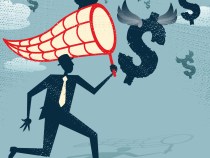
Facebook's share price tanked upon IPO, scaring plenty of private companies away from the public markets. But with its eventual recovery and now the stellar performance of Twitter's IPO out the gates, the Wall Street bell suddenly has a much nicer ring to it.
Just in the last few days we've heard of Square, Box, and Seamless moving forward with IPO plans.
Now, a soaring share price isn't always a good thing, and a sinking one isn't all bad depending on a company's intentions. But up and to the right boosts confidence of the market as a whole, and the shot in the arm from Twitter comes in sharp contrast to a rough 2011 and 2012 for technology offerings.
Facebook priced its May 2012 IPO high, and thereby raked in a ton of money for use on expansion, R&D, and acquisitions. What it sacrificed was perceived momentum. Though it was able to unload its shares at $38, the price would soon plummet to $18. That made Facebook look like a loser to the outside world, potential recruits and employees.
Soon we saw a grand exodus of veteran talent from the social network. Employees left citing they felt they had “done their duty” to make the world more open and connected. What they didn't say was that they may have preferred to leave the pimping of Facebook as a business entity to someone else while they went on a new startup adventure.
Now Facebook's share price is at $47.50. It's regained some of its luster (though not with teens). Those prized employees are still gone but it has plenty of money to buy new ones. Overall, it was a tough transition from private to public that spooked a lot of people. What CEO wants to go public if they risk half their market value evaporating overnight?
Twitter waited until some of that fear subsided. It then its IPO low. The original price range of $17-$20 it looked now seems undeniably cheap (oh the joys of hindsight). But even at the time, most considered Twitter worth well over $11 billion. It's become a backbone of digital communication whose raw, unfiltered nature gives it unique value in the social landscape. Even after pricing TWTR much higher at $26, many still though it was undervalued.
When Twitter IPO'd yesterday, its share price popped a remarkable 73 percent. Though it's down a bit today, it still closed around $41, high above its $26 starting point.
Twitter did leave more than $1 billion on the table. Achieving the more traditionally sought-after 15 percent to 20 percent pop could have given it a much bigger war chest to buy complementary companies and invest in growth. But what it gained was the public sentiment that Twitter's a winner, that it's here to stay. And that it's a beautiful time to go public.
Other companies apparently saw the sign. Payment service Square is in talks with banks, including Goldman Sachs and Morgan Stanley for an IPO in 2014, someone conveniently leaked to the Wall Street Journal. Square's sales are said to be around $550 million this year, with $110 million to $165 million in net revenue after payouts to credit card companies.
Cloud storage app Box has chosen Morgan Stanley, Credit Suisse and JPMorgan Chase as underwriters for an early 2014 IPO that could raise $500 million, says Reuters.
And food delivery service Seamless is eying a late-2014 / early-2015 IPO says The Deal Pipeline. It had $85 million in 2012 revenue, bought its biggest competitor GrubHub six months ago, and is on track for $200 million+ in 2013 revenue, Deal Pipeline reports.
Other companies that might IPO in 2014 include Dropbox, Zendesk, New Relic, and Atlassian.
The idea seems to be “get money while the getting's good.” Big private companies seem intent on getting their day in the Wall Street sun before the weather changes.
And the trend extends down to smaller startups private stories too, though their situation is very different. Pinterest may have raised $225 million because it wants to have plenty of money for expansion without fear the fundraising climate could get bleak if consumer investment dries up, as Fortune writes. Snapchat is said to be raising its own round of roughly $200 million.
Neither of these companies are earning any meaningful revenue right now. But rather than wait until they are so they could raise at better terms and even higher valuations, they're squirreling away the cash now.
One problem this presents is that these big IPOs and raises could inflate valuations for smaller startups, as Jack Altman of Hydrazine Capital writes. If they can't reach an exit before the market skies turn stormy, they may be left struggling to raise money, and end up with gloomy down rounds.
But for big private companies with solid revenue and a strong mobile presence, fast-tracking their way to getting their own stock symbol may be a smart bet. You never know what next year will look like.
Additional reporting by Alex Wilhelm
[Image Credit: Shutterstock, Institutional Investor]

ConversionConversion EmoticonEmoticon